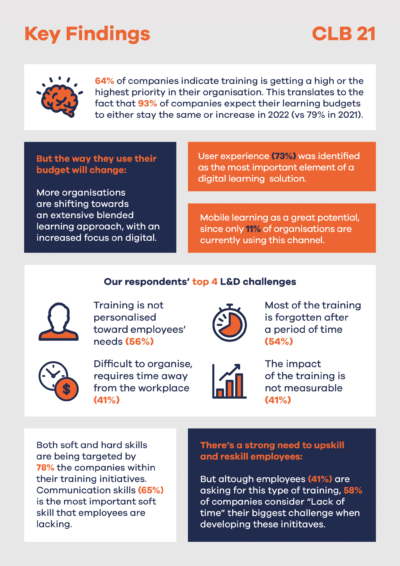The Challenges Of Corporate Training Moving Forward

48,9% of organisations agree that training is among the highest of priorities nowadays. Taking into account the changes the global workforce has undergone, one can hardly imagine what business could remain unchanged and prosper.
The desire for learning solutions isn’t present only towards the top of the corporate ladder, 41.5% of organisations have noted that it is their employees who are asking for upskilling and reskilling training.
What challenges do we need to address in our current training efforts?

After a survey of over 100 organisations based all across Europe, we’ve identified some of the key challenges faced in current training efforts. If we wish to thrive in the corporate world, these are some of the issues we need to tackle.
Taking precedence over all other issues, we find that 56% of organisations believed that current training is not personalised. This results in an inability to resolve the individual needs of employees, and thus reduces the efficacy of training efforts. The traditional ‘one size fits all’ methodology seemingly does not yield great results.
Secondly, 54% of employers worry that most of the training content is forgotten after a period of time. One can see how this relates to the previous point, if courses are more customised to fit specific employee needs, they will most likely teach things that will be applicable and relevant to an individual’s work life and/or environment. Consequently, retention rates would go up if employees are actively putting their new knowledge to use.
The third most common challenge encountered by organisations, at least 41% of them anyway, is the fact that they find trainings hard to organise. On top of that, they require time away from the workplace, which translates into having to restructure the workflow.
Lastly, 41% of employers feel like the impact of the training isn’t really measurable. Once again this circles back to the first two issues on the list, since if training efforts were personalised, and actually relevant to the day to day work life, results should be visibly noticeable. Additionally, if we already know that training should be personalised in order to maximise efficacy, we should consider a more individual approach towards measuring the success rates of the trainings too.
How to move forward in corporate training: The digital learning solution

Digital learning offers promising results when it comes to tackling the aforementioned challenges. It can be adapted to the needs of both employers and employees with greater ease than traditional learning methods. Plus, by its very nature, it can take place in most, if not all, work environments.
A fun and intuitive user experience can help with engaging employees, which for 73% of organisations is the most important element in digital learning solutions. 59,9% of employers find that digital trainings provide an effective knowledge transfer, considering that their built-in retention techniques work. Furthermore, its inherent compatibility and easy integration with other systems can truly help resolve the issue many companies face regarding employees having to spend time away from the workplace in order to do these trainings.
Digital learning tools truly have the potential to cover the needs of the corporate world moving forwards, they simply need to be finely tuned to tackle the main issues organisations have encountered so far. In a world that is increasingly digital, the solution will be digital too.

